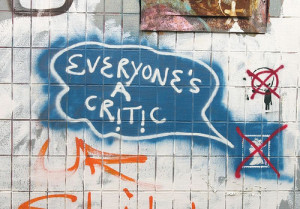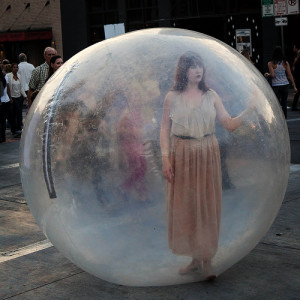People who are highly sensitive emotionally can be hard to handle. You never know what seemingly innocent statement or action will hurt their feelings and shut them in or set them off, and when that happens, it’s usually tough to fix the situation.
I’ve dealt with my fair share of sensitive people in life. Also, in my communication coaching, I frequently work with people who are dealing with a highly sensitive person or more in their own lives, and they wanna do it better. Based on these experiences, I wanna provide you some practical advice on how to deal with sensitive people effectively.
Avoid These 4 Sensitive Kinds of Statements
I’ve found that there are 4 kinds of statements in particular that are likely to trigger a sensitive person:
- Jokes about them. Because they don’t see them as friendly jokes, they seem them as you mocking them.
- Criticism, even when it’s pointed at groups they identify with, not at them directly. Because they take it as a rejection of their own person.
- Disagreeing with them. Again, because they perceive it as a personal rejection rather than a disagreement on a specific idea.
- Firm commands or blunt orders. Because they commonly feel belittled when receiving such orders.
If you wanna have better relationships with sensitive people, bear in mind these 4 types of statements and cut down on them when dealing with sensitive people.
I do not encourage you to avoid them all the time, at any cost. They still have a role in communication. Sometimes a negative feedback or divergent opinion is important to be expressed, despite the fact it will upset the other person.
I do encourage you though to work on consciously recognizing when you’re about to make a type of statement that may trigger emotionally a sensitive person, and carefully weigh the cost vs. the benefit to see if it’s worth it. Sometimes it will; many times you’ll be much better off if you just shut up.
Learn Sensitive People’s Expectations
Beyond things that upset the majority of sensitive people, each sensitive person has their own little triggers. This is because each has their own map of reality, which includes their own views and expectations on how others should treat them. And you may not share the same views.
For example, you may go out to dinner with a person who expects you pick up the check, and even though you’re fine with doing that, you don’t even think about it, because in their place you would not have the same expectation. Such differences in perspectives create further complications.
 The best way to deal with this thorny issue is to try to learn more about people’s expectations, especially the highly sensitive ones.
The best way to deal with this thorny issue is to try to learn more about people’s expectations, especially the highly sensitive ones.
Ask them questions about the things they value and how they like to be treated. Listen attentively and try not to judge them, encourage them to communicate openly with you.
The better you understand a person’s expectations and perspectives, the better equipped you are to fulfill them. This doesn’t mean that you always have to cater to their expectations. Sometimes they will clash with your own needs, and your needs will come first. But it’s still good to know their expectations and be able to cater to them when you want to do so.
Fixing the Situation with Style
Unavoidably though, as effectively as you manage your words and actions around sensitive people, once in a while you will still do or say something that will upset them.
Most folks are bad at handling such situations. They will often try to apologize and fix things in a way that only makes things worse. I’ve heard many apologies like: “I’m sorry! But it was only a joke. What’s your problem, anyway?”
Such a comment will not work well with a sensitive person, because it further invalidates them, making them feel even worse.
When it comes to apologizing to a sensitive person, I have one golden rule: show them you are not rejecting them as a person. Because that’s really the big problem with sensitive people: they take jokes, criticism, divergent opinions and blunt orders as a personal rejection.
For example, after making a joke that got them offended, a good comment to fix the situations is something like: “I’m sorry, I was just joking. You know I think you’re a cool person and I like spending time with you.”
This comment reassures the person that the joke did not mean anything bad, and will likely make them feel much better. Get used to making such comments with sensitive people at least once in a while, if you wanna stay on their good side.
Sometimes, Dealing with Sensitive People Cautiously Is Not Worth It
The strategies above for improving your communication with sensitive people are based on the premise that it’s worth it. The sensitive person has some noteworthy redeemable qualities that make it worth trying to have a good relationship with them.
Sometimes though, this is not the case. All the effort to be on your toes constantly, adapt yourself and try to fix things in dealing with a sensitive person, is simply not worth it considering what you get in return. The benefits do not justify the cost.
In such cases, you’re better off not trying to cater to a sensitive person, and treating them as you would treat most people (which I imagine is a considerate, but not hyper-considerate way). If it upsets them or drives them away, so be it.
Some folks are not comfortable with hearing such advice. They don’t like the idea of letting people get upset at them, stay upset at them, and sometimes leave them. Usually I find this is because they care too much about having other people’s approval. They want everybody to like them and they wanna get along with everybody.
This is simply not a healthy attitude. You wanna learn to be okay with some people not liking you and not enjoying your company. You wanna learn to stop seeking everybody’s approval.
With this is mind, I recommend you check out this practical presentation, in which I’ll teach you my step-by-step, tried and tested method for gaining social confidence and stopping seeking people’s approval. If you struggle with breaking bad relationships or tolerating disapproval from others, this presentation will help you a lot.
Dealing with sensitive people is tricky. But with a good grasp of their psychology, strong communication strategies and the right attitude, it is something you can do effectively. Such tools are what I’ve offered you in this article.
For more communication and relationship advice from me, get right now onboard my free newsletter and I’ll talk to you some more there.

 Usually when making conversation with another person, I recommend you find topics that you both enjoy equally, and talk about those. So if the conversation lands on a topic you fancy, but the other person doesn’t seem to resonate with it, you try to change the topic, just as you try to change it in the reverse situation.
Usually when making conversation with another person, I recommend you find topics that you both enjoy equally, and talk about those. So if the conversation lands on a topic you fancy, but the other person doesn’t seem to resonate with it, you try to change the topic, just as you try to change it in the reverse situation. I found that when someone tells you that you don’t talk much, the best answer is a short, simple one. Something like “Yeah, sometimes I’m not in the mood to talk” or “I just don’t have anything to say right now” is enough.
I found that when someone tells you that you don’t talk much, the best answer is a short, simple one. Something like “Yeah, sometimes I’m not in the mood to talk” or “I just don’t have anything to say right now” is enough. Personally, having coached multiple individuals with anthropophobia and studied a lot of the psychological research on this subject, I consider that multiple causes comes into play, but the most important one concerns negative experiences relating to others.
Personally, having coached multiple individuals with anthropophobia and studied a lot of the psychological research on this subject, I consider that multiple causes comes into play, but the most important one concerns negative experiences relating to others. Another likely explanation is that some of the people around you have tried to be social with you in the past, but your response was less than welcoming. Maybe you didn’t say much, you answered their questions mostly with two-word statements, and you didn’t appear to enjoy talking to them.
Another likely explanation is that some of the people around you have tried to be social with you in the past, but your response was less than welcoming. Maybe you didn’t say much, you answered their questions mostly with two-word statements, and you didn’t appear to enjoy talking to them. Next time before you go out, take a good look at yourself in the mirror. Note your clothes, their fit, your hair, your posture and your overall look. Try to observe yourself as if you’re observing another person that you’re seeing for the first time.
Next time before you go out, take a good look at yourself in the mirror. Note your clothes, their fit, your hair, your posture and your overall look. Try to observe yourself as if you’re observing another person that you’re seeing for the first time. William Shakespeare once said (in Hamlet, to be more precise): “There is nothing either good or bad, but thinking makes it so“.
William Shakespeare once said (in Hamlet, to be more precise): “There is nothing either good or bad, but thinking makes it so“. I believe questions work best when they are genuine, when they reflect an authentic curiosity you have. If you just ask about something because you think you should, but you don’t really care about it, that will usually show.
I believe questions work best when they are genuine, when they reflect an authentic curiosity you have. If you just ask about something because you think you should, but you don’t really care about it, that will usually show.